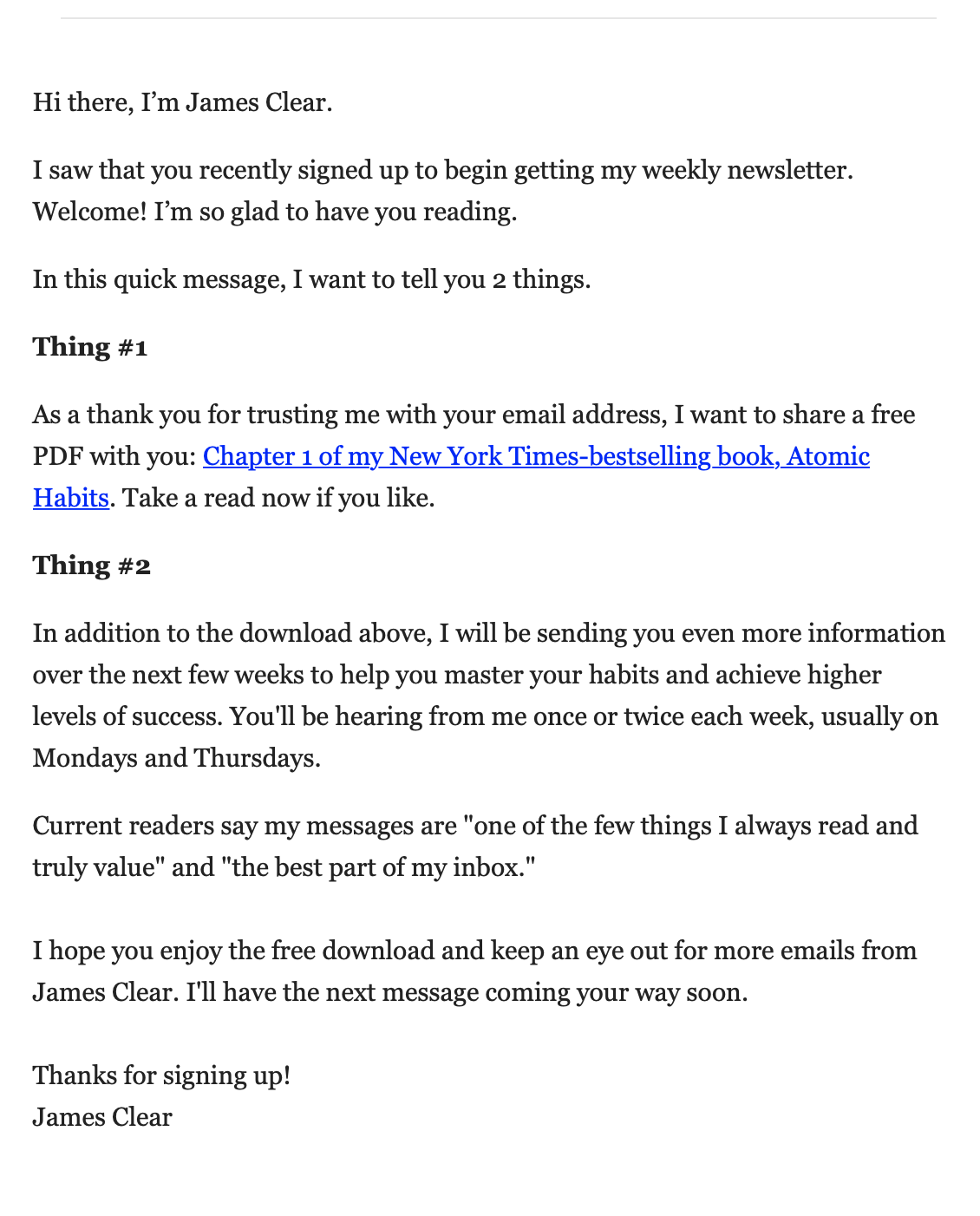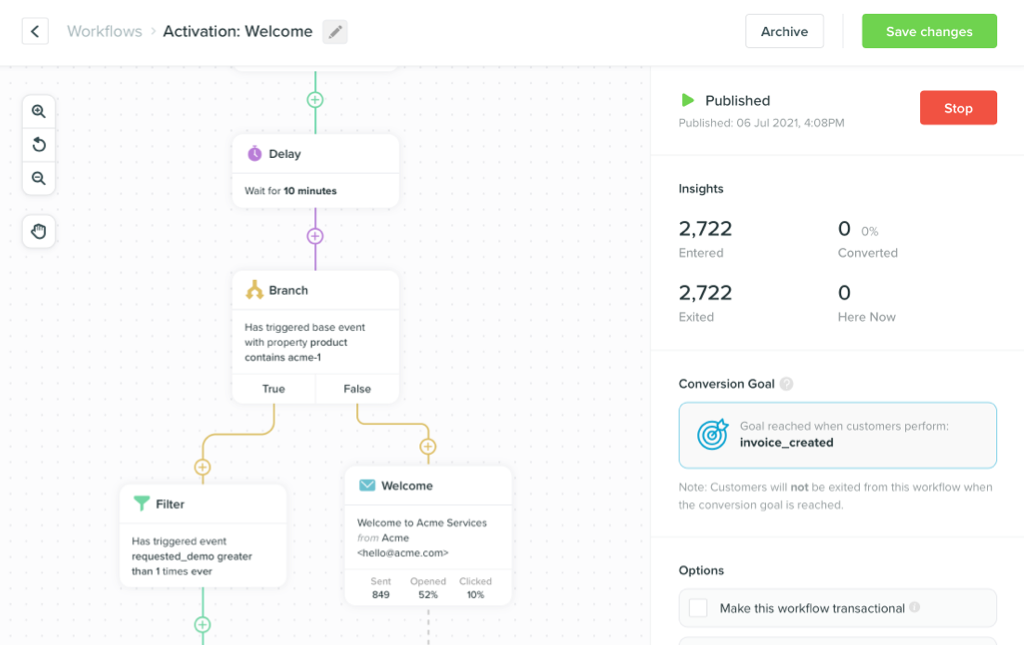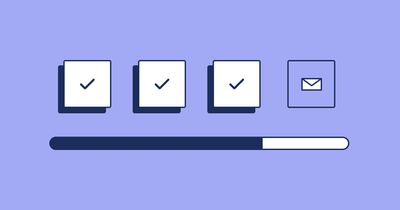
Onboarding Emails
-
Messaging and AutomationUpdatedPosted:
On this page
Onboarding emails are designed to help new customers to use and gain value from a product or service.
Educating customers on the key benefits they can receive from the product, and helping them reach the product ‘aha moment’ is one of the most effective ways to onboard new customers and drive long-term engagement.
Welcome onboarding emails
Welcome emails are one of the most important emails in the customer onboarding journey. Use your welcome email to guide new customers to the next step. Giving them an idea of what to expect will help make their first experience with your product or service a positive one.
Habitat
Habitat’s welcome email is loaded with rich imagery – engaging new customers with a friendly GIF, beautiful design and vibrant color palette. Offering a clear primary CTA with a strong incentive drives new customers to take the next step towards a purchase. Micro-CTAs encourage new customers to explore new products and engage with the brand on social channels.
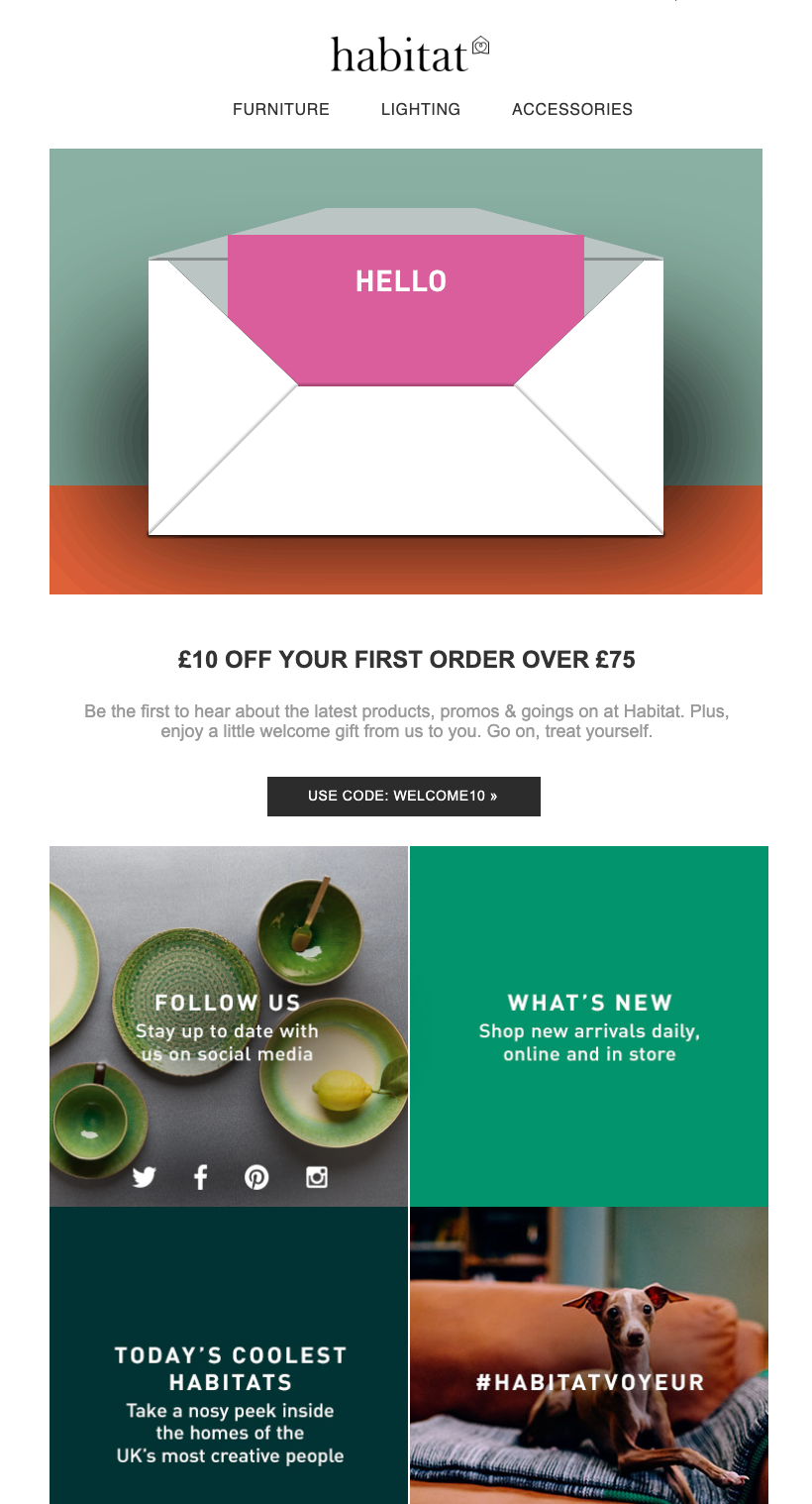
Ello
Ello’s welcome email aligns perfectly with the rest of their branding; a unique typeface, lots of white space and minimal copy. The Ello experience is the same in the email as it is on their website, delivering a strong and consistent brand identity. The call-to-action (CTA) is clear, simple and focused.
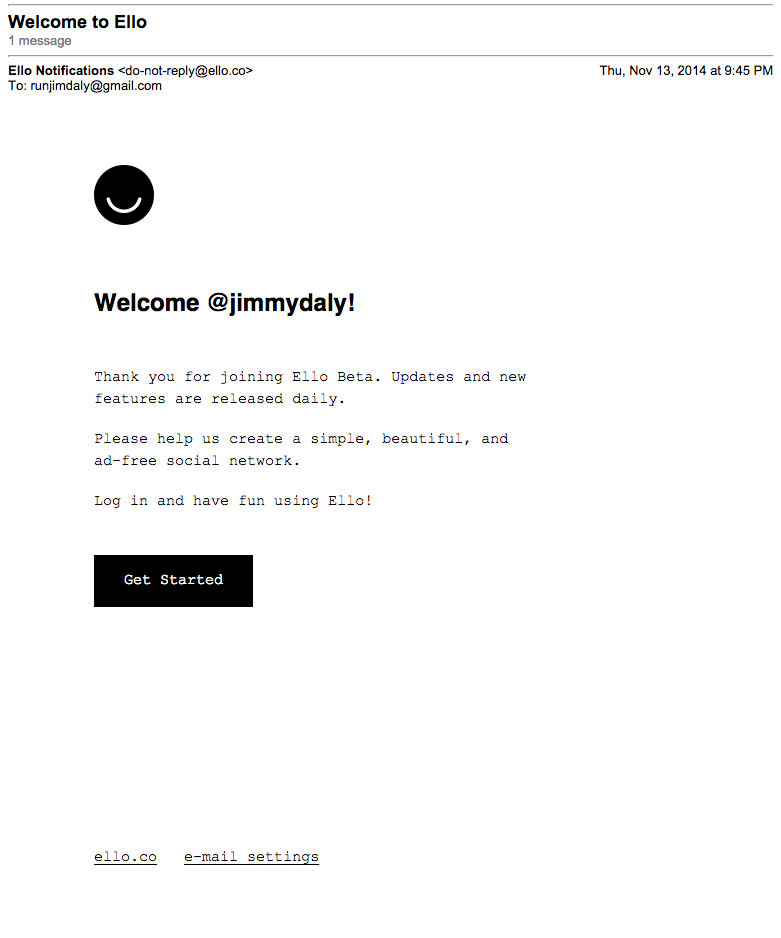
James Clear
Settings expectations is always a good idea. If people expect to hear from you every day, they’ll be disappointed if you only email twice a week. And if you promise to email weekly, they’ll be annoyed if you send multiple messages each week.
James Clear uses his welcome email to set expectations.
Squarespace
Squarespace’s welcome email focuses on getting new customers to sign in to their account and upgrade. Providing a simple and clear way to contact the support team makes it easy for customers to reach out if they need any help in the process.
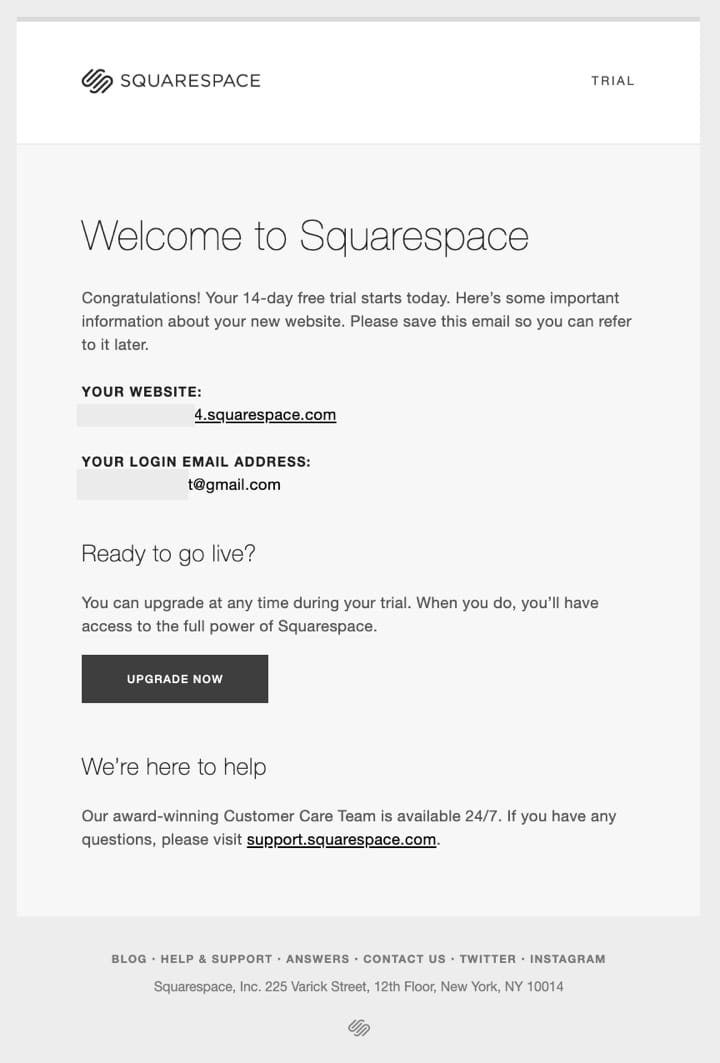
Sqwiggle
If your product requires new customers to make a download or install, it’s imperative that they do so early in the journey so that they can gain value from it. If the free trial period goes by without a download, you can pretty much guarantee they won’t convert into a paying customer.
Sqwiggle keeps it simple by encouraging users to start using the app right away.
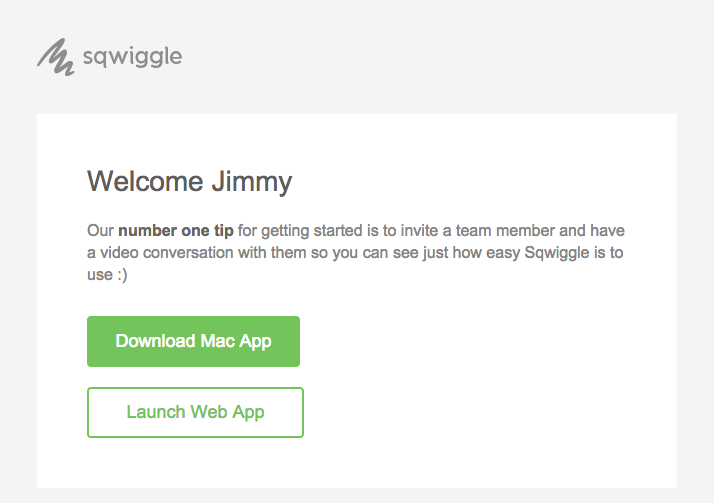
Read more about welcome emails.
Personal onboarding emails
Personal welcome emails are a great way to start a conversation with new customers. Take the opportunity to find out what they hope to achieve from using your product so you can point them in the right direction. This is valuable feedback that can be used to inform or improve your automated onboarding campaign.
When creating automated personal welcome emails, it’s important to consider the timing of when they delivered. An automated message sent 30 seconds after someone signs up, at 3am in your timezone doesn’t exactly look personal. Vero’s timezone scheduling makes it easy to ensure emails are delivered at the optimal time for each of your customers.
AnyPerk
In nine short sentences, AnyPerk founder, Taro Fukuyama introduces you to the service, tells you where to get started and extends an offer for assistance. It’s succinct and very effective.
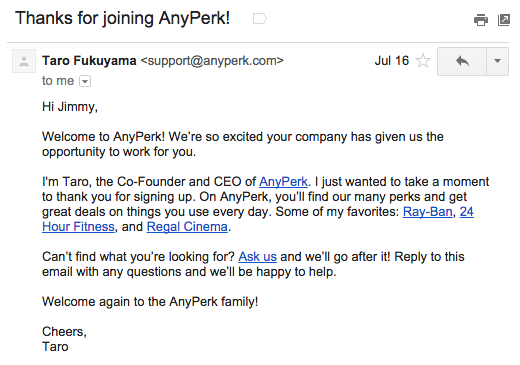
BugHerd
Now known as Macropod, this welcome email from founder Alan Downie is personal and simple. It sets the tone for the kind of experience you can expect when using the product. It might seem counterintuitive at first but this is one of the best ways to brand yourself to new users because of how it makes them feel … like they are a person, not a “user”.
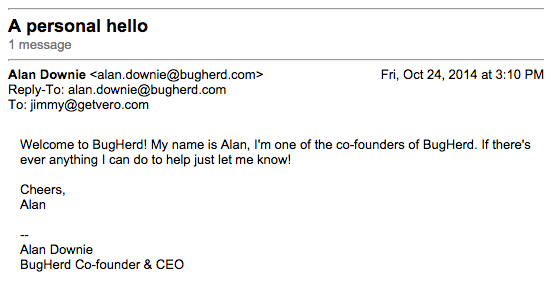
Buzzstream
Founder Paul May uses his welcome email to set expectations and offer the services of the customer support team. His software is all about building relationships and that’s exactly what he does here.
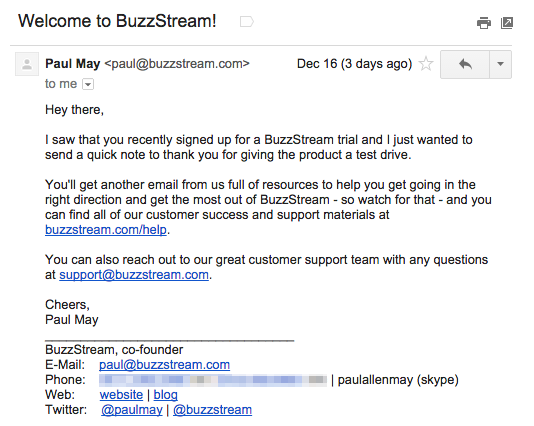
Getting Started onboarding emails
The “Getting Started” email can be sent in addition to or instead of a welcome message. The sooner users take action, the sooner they can get value from your product. If you offer a free trial, it’s essential to get people up and running as fast as possible.
Don’t overwhelm people with a long email. Use the getting started email to get new folks to take a single step.
iDoneThis
This is an incredibly functional email. iDoneThis users receive a daily email that looks almost exactly like this one. Replying with the tasks you accomplished that day adds your “dones” to your calendar. The getting started email explains how this works then gives you the opportunity to try it right away.
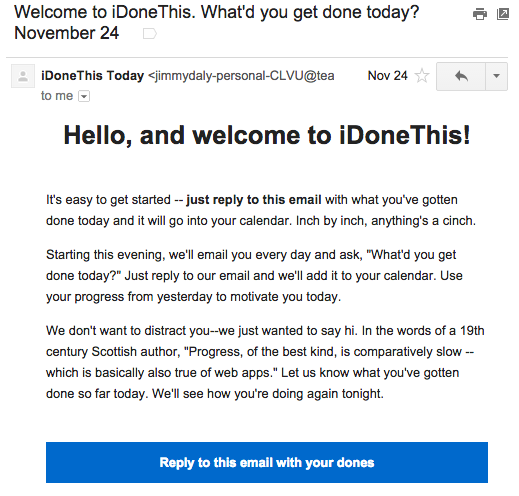
Majestic
The Majestic team knows that if users understand how to use their suite of tools, they are more likely to stick around. They offer a one-on-one session to go over their tools and sell it by letting people know that others just like them have really enjoyed it.
The message has a personal feel but the marketing value is obvious.
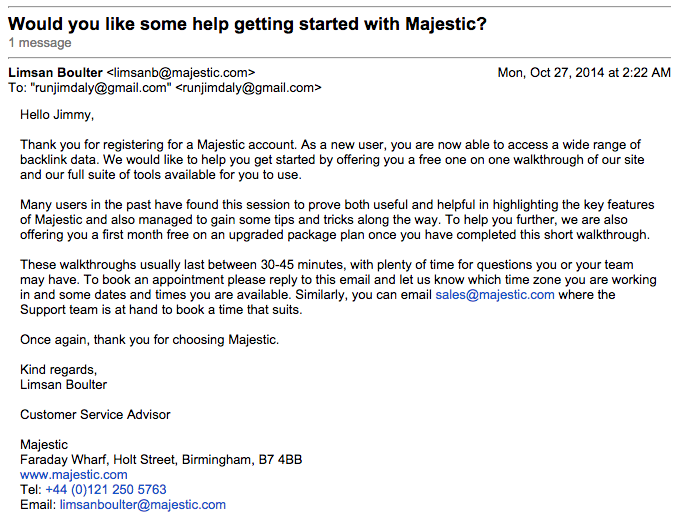
Raven
If you have something important to say, use a button. The more important the message, the bolder the button should be.
Raven uses a bold button, so they must know that users who take the class are more likely to convert to paying customers.
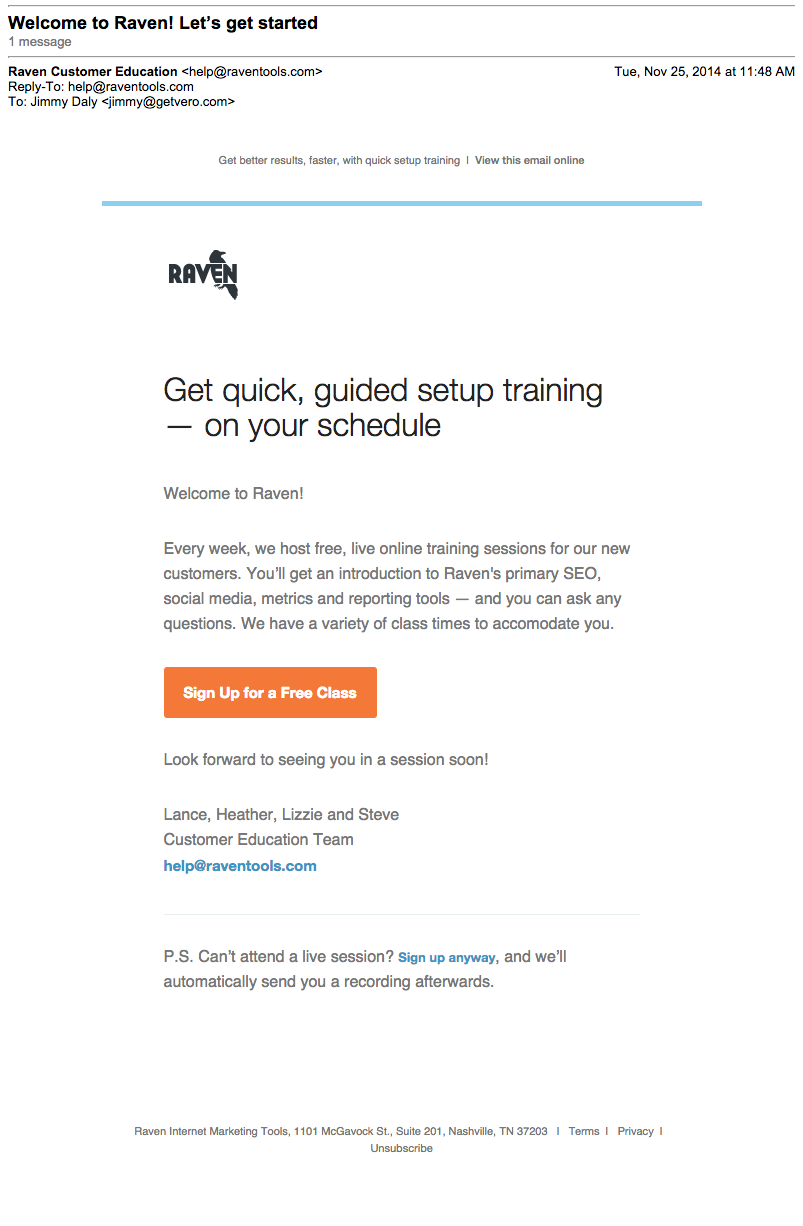
Zapier
This is an example of a behavioral email. Zapier can see that the user has signed up for a free trial but hasn’t done much. With that knowledge, they can trigger a very targeted email. This email is loaded with ideas for using Zapier and it’s a great catalyst for onboarding.
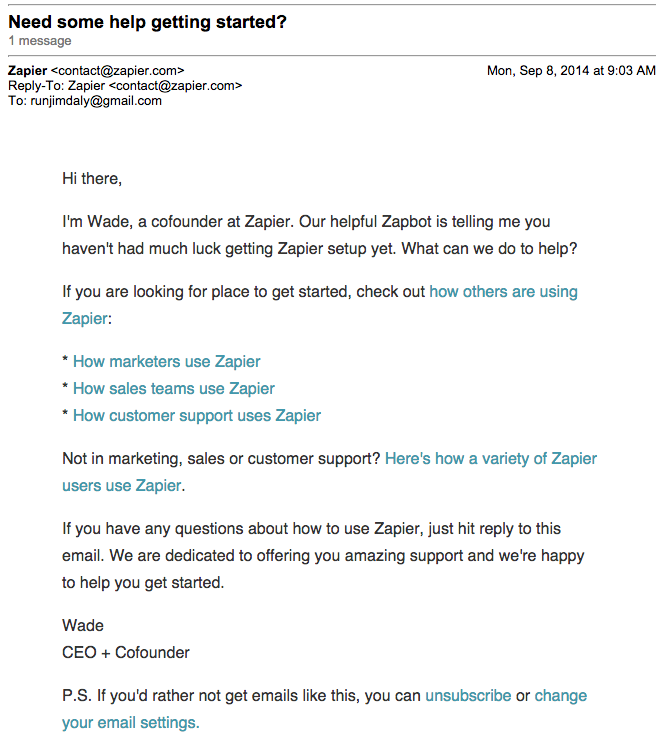
Free Trial Ending Emails
It’s your last chance to convert. Don’t beat around the bush. In the examples below, you’ll find some good tactics for re-engaging users one last time.
Beatrix
A common scare tactic is to tell people that their data will be deleted. You need to be careful not to suggest that this is an ultimatum but you also need to make the message clear.
Beatrix does this by letting you know your work won’t be saved, then explaining one last time why their app is really valuable.
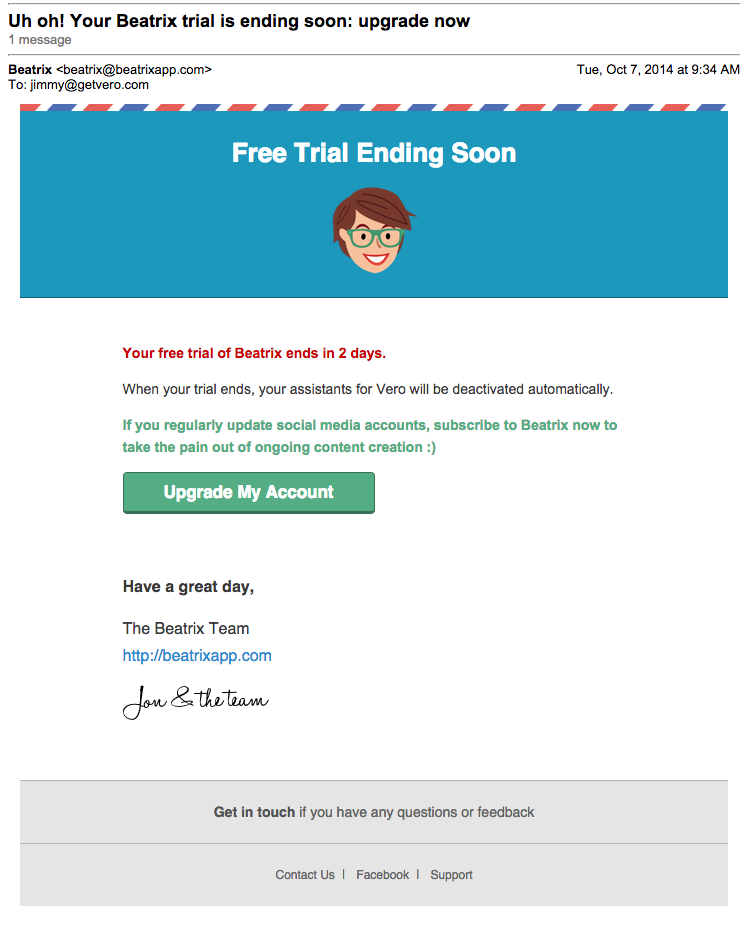
ClickInsights
One reason that people let free trials lapse is that they don’t understand how or why to use an app. Tony from ClickInsights lets you know that your data will be gone, then makes himself available for assistance.
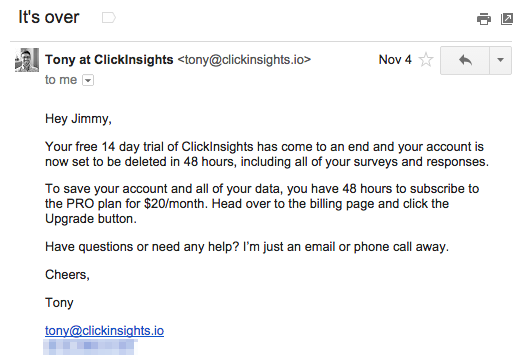
Mention
Mention takes a different approach. Users can always stay on a free plan so they use this onboarding email as an opportunity to discuss the benefits of a paid plan. It’s a nicely designed email with clear, bold buttons to highlight the calls to action.
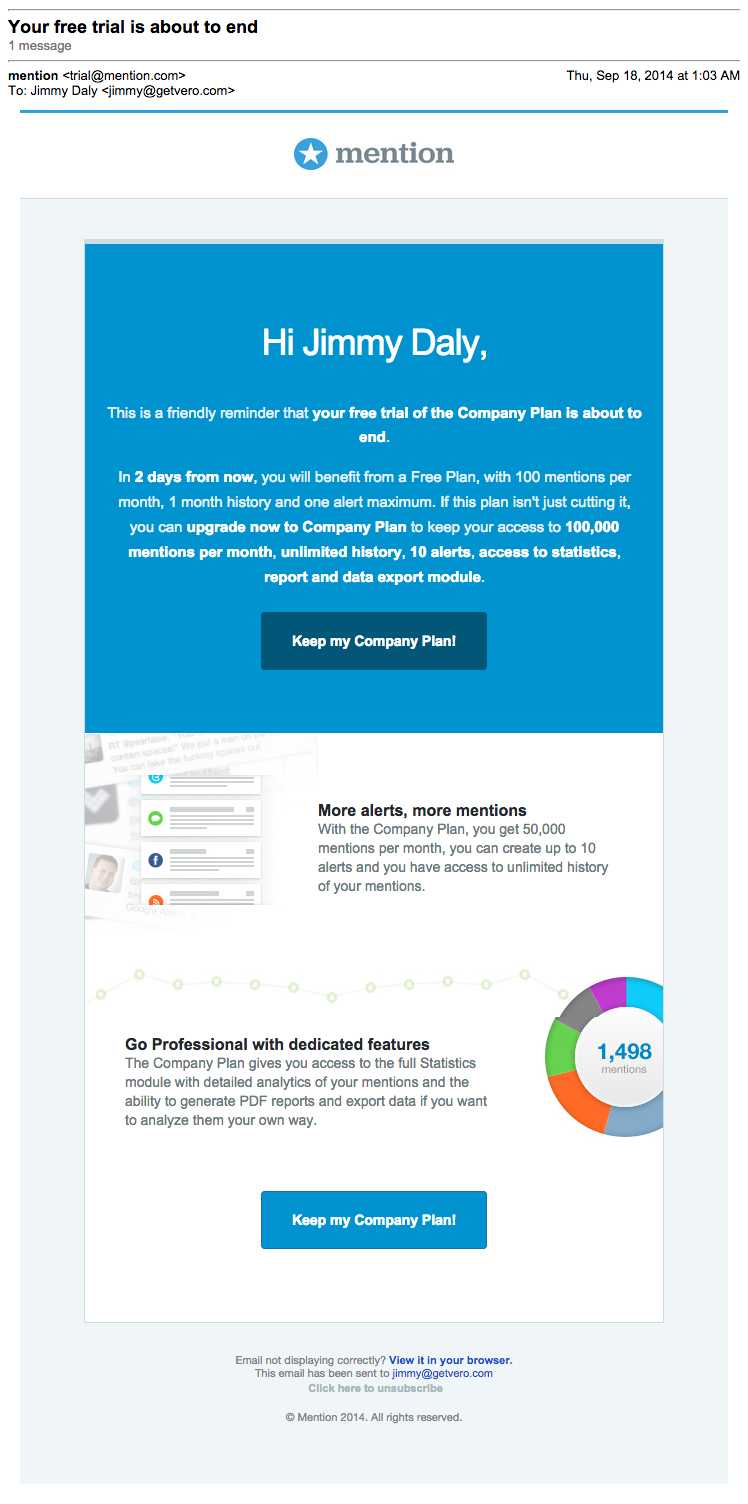
Activation Emails
Transactional in nature but promotional in practice, activation onboarding emails hit the email marketing sweet spot. Use onboarding emails like this to get things done.
Gazelle
“Click that button to activate your account, but while you’re at it, check us out of Facebook and Twitter as well.”
Keeping users engaged on multiple channels is a great way to market to them passively. Then, when they are in need of your service, you are top-of-mind.
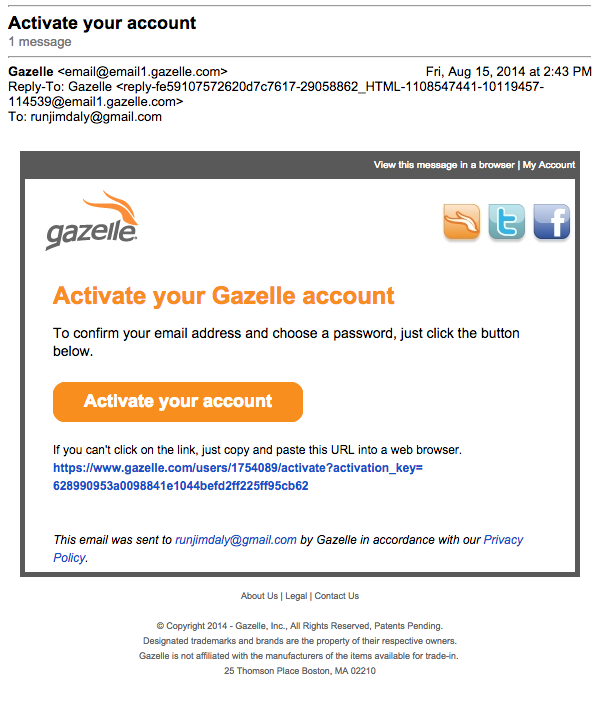
Moz
Moz is a great at branding. The blog, the community, the conference, the videos … it’s all part of what makes Moz a household name. It’s no surprise then that their activation email is consistent with the rest of that experience. From the copy to the design, it sets the expectation that this is going to be fun.
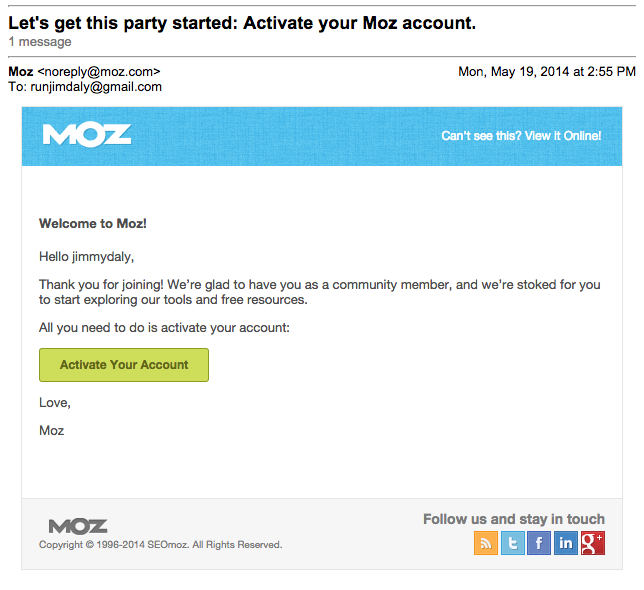
UserVoice
At their core, activation emails require that users take action. Depending on your product or service, it may be best to take the UserVoice approach: a dead-simple, plain-text email.
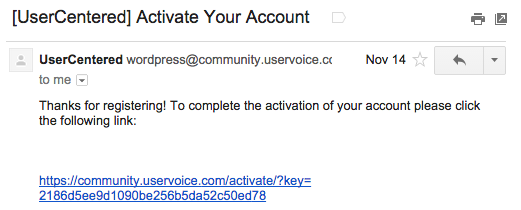
Nudge Emails
You’ve seen plenty of blog posts that start like this: “Why you should …”
That format is effective for onboarding emails too, as long as your focus is in the right place. If your goal is a conversion, shape the content to provide at least three really good reasons for people to convert.
Shopify
When Shopify explains why popups are valuable to their customers, they are actually accomplishing two goals. First, they are showing customers a new way to generate revenue and second, they are driving people to the Shopify app store.
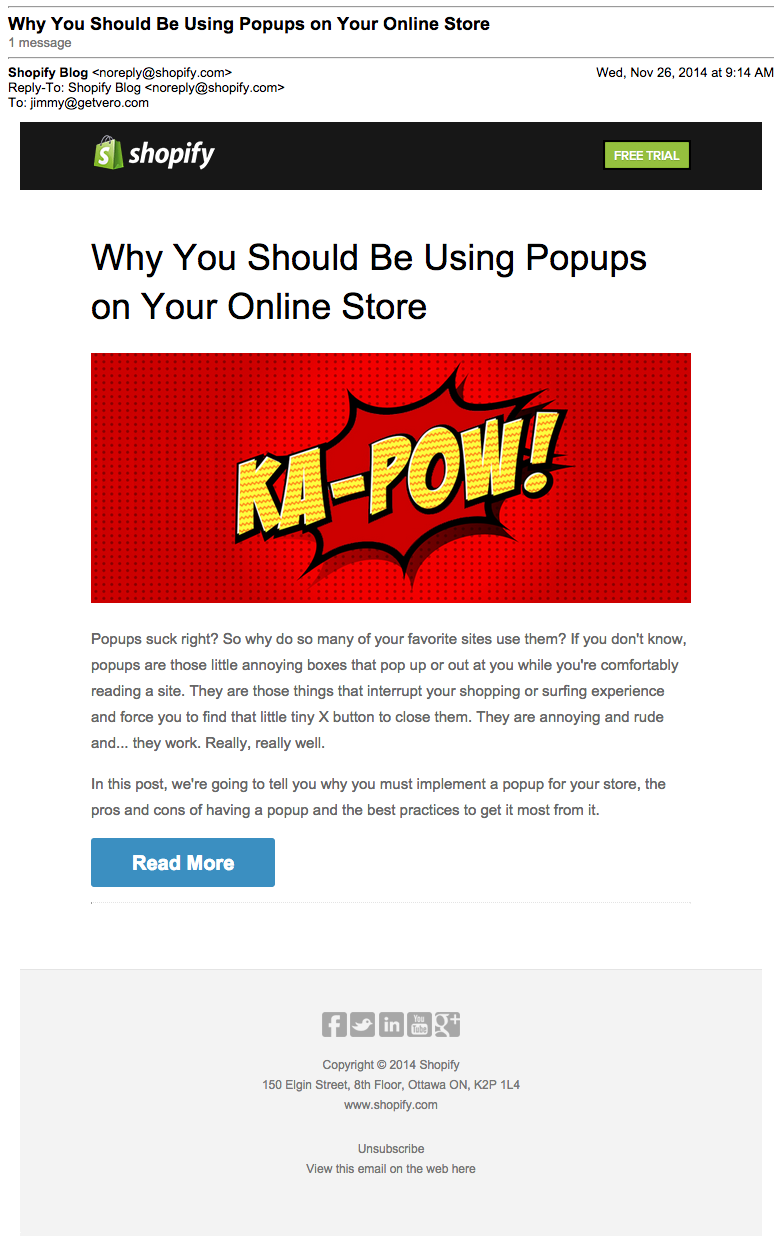
SMX
Search Engine Land conferences are a big investment. A long-form email like this provides fodder that SEOs and marketers can use to convince their bosses to foot the bill.

Trunk Club
The Trunk Club mobile app really does make customers’ lives easier. They keep this email short and do a nice job selling the convenience of the app before closing with a clear call to action.
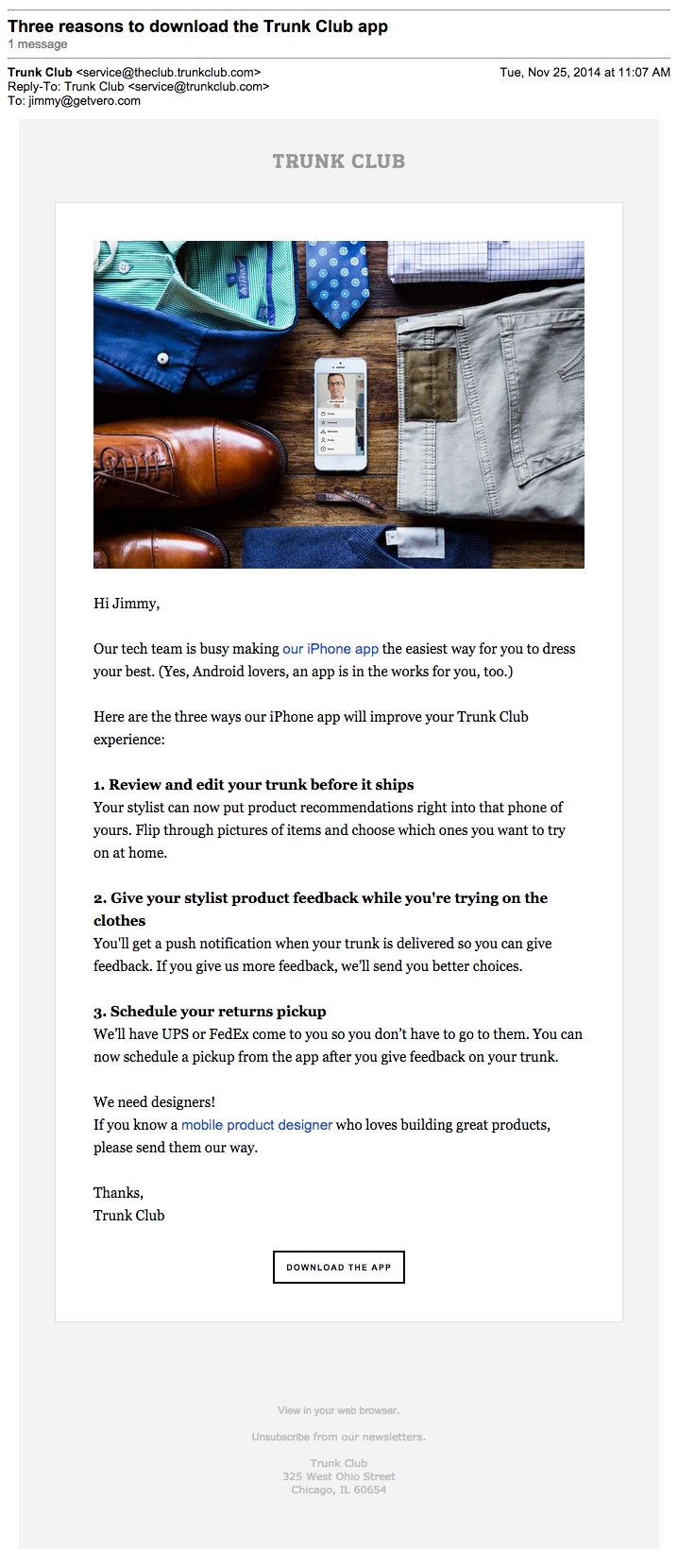
Complete Your Profile onboarding emails
In order for data-driven email marketing to happen, you need data.
So if your app or service requires users to fill out a profile, it’s really important they do it so you can tailor the rest of your marketing around that data.
The emails here are good examples of ways to get this done fast.
Google Places
This is a pretty old onboarding email but it illustrates the point well. Without a good profile, Google Places isn’t very useful to the user. And once Google has that data, the real marketing can begin.
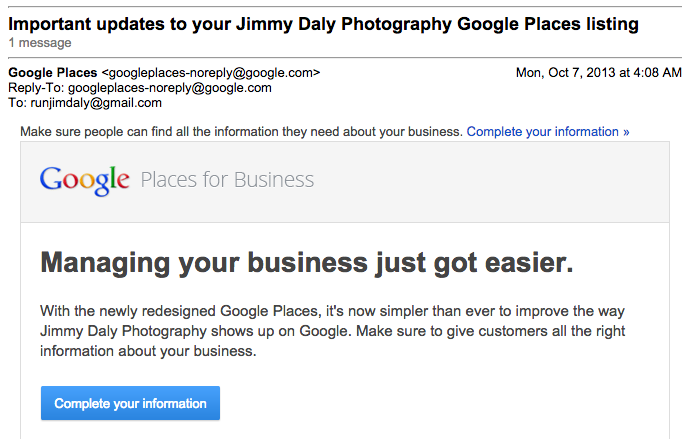
LearnVest
One basic tenant of email marketing that is over overlooked is simply telling people what to do next. Look at the copy that LearnVest uses to achieve this.
- “Your Itinerary”
- “How to navigate LearnVest”
- “We will take it from here”
- “Your Financial Next Step: Complete Your Profile”
This setup eliminates anxiety and makes it very easy for users to make their way through the process.
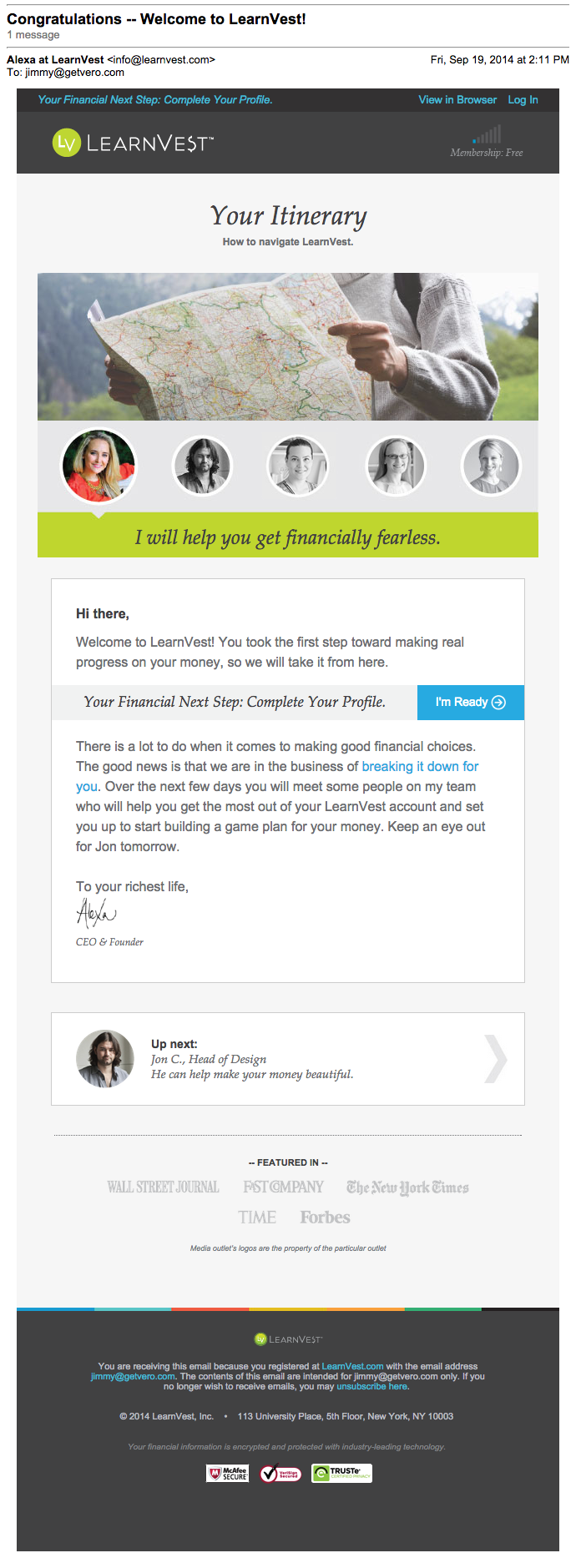
Twitter has a number of onboarding challenges. They need new users to complete a profile, start following other users and send tweets of their own.
They use the common 1-2-3 method to show people exactly what to do. They even match the steps to an empty profile to show you where the info will go.
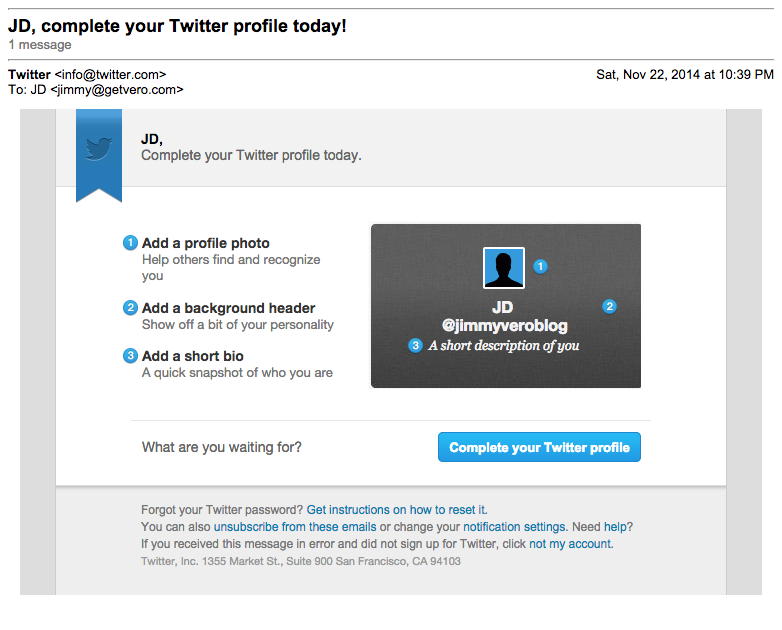
Upsell Emails
The word “upsell” has negative connotations. And that’s too bad because often, upsells can really add value for customers. If you frame your emails correctly, you can work upsells into your email marketing without annoying your customers. In fact, they might really appreciate you letting them know about something great they missed.
Dollar Shave Club
This upsell email from Dollar Shave Club is cleverly disguised as a transactional message. It shows you what’s already in your next shipment and asks you to confirm that your shipping address is correct. Then, it shows you a number of products that can make your shaving experience better.
It’s a super smart way to broach the subject, and the products are really good (I use them myself!).

Evernote
This is a great onboarding email for five reasons:
- The context is clear.
- It explains the benefit before the call to action.
- The copy is loaded with strong verbs.
- It highlights benefits, not features.
- You cannot miss the calls to action.
Read way more about this email here.
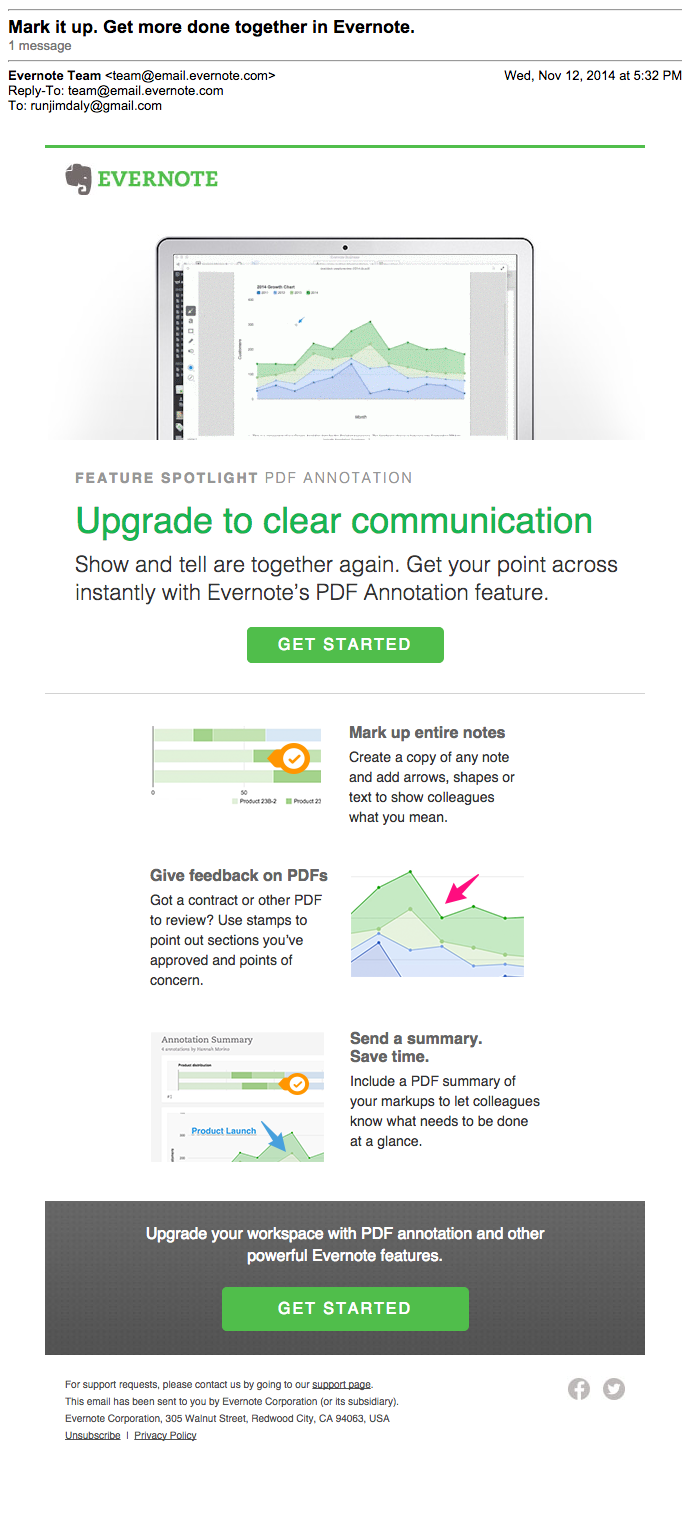
Priceline
What differentiates great marketing from poor marketing?
Context.
Which is why this onboarding email from Priceline is so good. They know I’ve already booked a hotel, so what other things might I need? A rental car? Another night in the hotel?
I’m not surprised to be offered these extras and if I end up needing them, I already know exactly where to go.
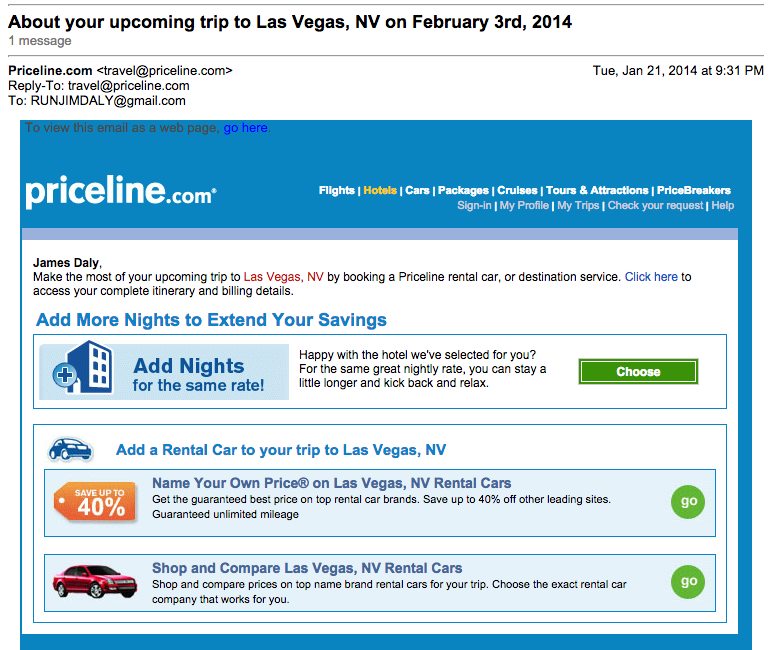
Learn more
Want to send more personalized mobile and email messages to your users?
Learn moreCustomer story

How UNO uses email marketing from the data warehouse to deliver personalized mortgage broking

